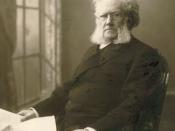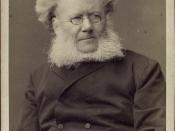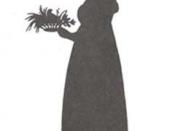Henrik Ibsen's play "Rosmersholm" tackles the issue of the oppression of new and radical ideas, liberal thought, and self-knowledge. The forces of oppression at work in the play range from organized political forces to interior motivations that distract one from completely realizing self-actualization. A battle is taking place between those who want to change the course of future events and establish a new order and those who wish to maintain the comfortable status quo while squelching any attempt to disrupt that state of being. Sometimes this battle even takes place within a single individual.
John Rosmer and Rebekka West represent the wish to change the current order of the universe and create a new society of free thought, and in this they must battle with the representative of the old school of thinking in the person of the headmaster of the school, Kroll. Rosmer himself is the key to the battle against oppression since he was once the figurehead for the traditional way.
He was raised in a strict family atmosphere and clung tightly to the ideas with which he was born. He became a clergyman and adhered to the ideals of the church. The church can be seen as the ultimate symbol of the conservative policy which Kroll and his faction which to live under. Not only does he wish to live under that policy, but he also insists that everyone else live under it. Rosmer has drifted away from the conservative point of view and so finds himself in battle against his former ally, Kroll. Rebekka West is a so-called "emancipated" woman and has been instrumental in getting Rosmer to change his views. She and Rosmer have engaged in readings that has enlightened them both, and they share a world-view completely at odds with...


